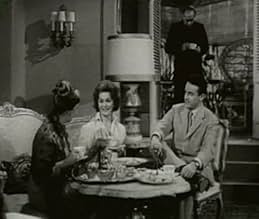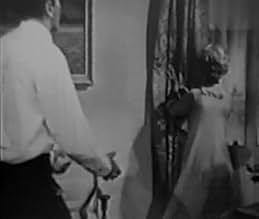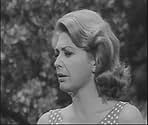A collection of tales about paranormal events, horrifying folklore, and the world of the unknown.A collection of tales about paranormal events, horrifying folklore, and the world of the unknown.A collection of tales about paranormal events, horrifying folklore, and the world of the unknown.
Browse episodes
Featured reviews
10penwil09
I am a connoisseur of "horror" movies/series, and have seen them all since the 1950s, but One Step Beyond remains the scariest of all the series. The only one that came close was Boris Karloffs'-Thriller! John Newlands' beginning monologue reels you in, to have you gripping the arms of your chair during the story, too scared out of your wits to even move, then having the story ending to Mr.Newlands epilogue to further heighten your anxiety of being too fearful to go to sleep!! Unlike..Twilight Zone, Hitchcock, Night Gallery,Tales from the Crypt, Outer Limits and X-Files which ALL have humorous episodes which discount their "scare-quotient", and leaves you disappointed....however "O.S.B."satisfies the most discriminating of "scary-movie" tastes !!! O.S.B never had one "hokey" episode that would tickle your funny bone and that is what makes for excellent scare tactics. I wish they had this series on DVD !!!
I'm a huge fan of "One Step Beyond". I've been watching it since the early 70's in syndicated reruns and own all 96 episodes on VHS. I can safely say, adjusting the rocks in my head of course, that "OSB" is easily televisions greatest supernatural series.
I don't want to knock "The Twilight Zone" because, while that show was not scary or nearly as eerie and atmospheric as "OSB", it certainly deserves it's place in television history. To say however that "OSB" was merely a "spook" show and that "TZ" was the trend-setter, well that is just as inaccurate as it is crazy. That's just looking at things through "TZ" colored glasses. Putting aside the fact that "OSB" premiered 10 months before "TZ" and putting aside the fact that when "TZ" finally started airing it was trounced in the ratings by "OSB" and putting aside the fact that Rod Serling called John Newland to meet him for lunch to explain that he was doing a show like Newland's and that it would be purely fiction and not a rip-off of Newland's already established hit, consider this, or better yet, think about the following.
Watch "OSB's" "The Vision" which aired 3/24/59 and then take a look at Serlings "The Purple Testament" which aired 2/12/60. Watch "OSB's" "The Devil's Laughter" which aired 3/31/59 and then watch Serlings "Execution" which aired 4/1/60. Or, in one of the more blatant "coincidences", take a look at "OSB's" "The Haunted U-Boat" which aired 5/12/59 and then watch Serlings "The Thirty-Fathom Grave" which aired 1/10/63. See what I am getting at folks? Seems that a lot of "TZ's" stories have a striking resemblence to episodes aired a lot earlier on "OSB". And these are just a few of many examples. Hmmm! Rod, where did those ideas come from afterall? Watch "OSB's" "The Burning Girl" and tell me that it isn't a dead-on, early version of Stephen Kings "Carrie"! Again, I don't mean to knock "The Twilight Zone" but my point is that "One Step Beyond" was much more then a "spook" show or some golden age TV fodder. It was truly the father of all supernatural television series that followed and the true trend-setter. And obviously, an inspiration to all the shows that followed, "TZ" included. Those who don't know about "OSB" simply aren't true television fans.
This "spook" show television sidebar, as "TZ" maniacs call it, boasted some great talents in lead roles. Some veterans and some soon to be stars. Cloris Leachman, Warren Beatty, Jack Lord, Christopher Lee, Elizabeth Montgomery, Donald Pleasence, Ross Martin, William Shatner, Robert Loggia, Mike Conners, and Charles Bronson, just to name a few. How about writers like Don M. Mankiewicz, Charles Beaumont(yes, the very same), Larry Marcus and Collier Young. Surely talent like this elevates this program from "spook" show status. There isn't a person I have come across that doesn't remember it. And the key is that this is a show who's episodes stay with you for a lifetime and that, to me, is one of the marks of excellence.
John Newland was not only the perfect host, but a very gifted and talented director. The use of light and shadows to create an intense feeling of unease, spookiness and a downright eerie feeling. The inventive close-ups and overhead shots. Quite simply, Newland and this show were quite ahead of it's time. Take a look at "Ordeal On Locust Street" and tell me straight faced that you don't see "The X-Files". Watch "The Hand" and tell me you don't feel like your watching a film noir. Just fantastic. Quite simply, there wasn't anything like it before and nothing like it since.
If your looking for a real, honest to goodness spooky half-hour, look no further then "One Step Beyond". Just goes to show that true commitment, love and doing something you believe in can produce something unique and magnificent.
I don't want to knock "The Twilight Zone" because, while that show was not scary or nearly as eerie and atmospheric as "OSB", it certainly deserves it's place in television history. To say however that "OSB" was merely a "spook" show and that "TZ" was the trend-setter, well that is just as inaccurate as it is crazy. That's just looking at things through "TZ" colored glasses. Putting aside the fact that "OSB" premiered 10 months before "TZ" and putting aside the fact that when "TZ" finally started airing it was trounced in the ratings by "OSB" and putting aside the fact that Rod Serling called John Newland to meet him for lunch to explain that he was doing a show like Newland's and that it would be purely fiction and not a rip-off of Newland's already established hit, consider this, or better yet, think about the following.
Watch "OSB's" "The Vision" which aired 3/24/59 and then take a look at Serlings "The Purple Testament" which aired 2/12/60. Watch "OSB's" "The Devil's Laughter" which aired 3/31/59 and then watch Serlings "Execution" which aired 4/1/60. Or, in one of the more blatant "coincidences", take a look at "OSB's" "The Haunted U-Boat" which aired 5/12/59 and then watch Serlings "The Thirty-Fathom Grave" which aired 1/10/63. See what I am getting at folks? Seems that a lot of "TZ's" stories have a striking resemblence to episodes aired a lot earlier on "OSB". And these are just a few of many examples. Hmmm! Rod, where did those ideas come from afterall? Watch "OSB's" "The Burning Girl" and tell me that it isn't a dead-on, early version of Stephen Kings "Carrie"! Again, I don't mean to knock "The Twilight Zone" but my point is that "One Step Beyond" was much more then a "spook" show or some golden age TV fodder. It was truly the father of all supernatural television series that followed and the true trend-setter. And obviously, an inspiration to all the shows that followed, "TZ" included. Those who don't know about "OSB" simply aren't true television fans.
This "spook" show television sidebar, as "TZ" maniacs call it, boasted some great talents in lead roles. Some veterans and some soon to be stars. Cloris Leachman, Warren Beatty, Jack Lord, Christopher Lee, Elizabeth Montgomery, Donald Pleasence, Ross Martin, William Shatner, Robert Loggia, Mike Conners, and Charles Bronson, just to name a few. How about writers like Don M. Mankiewicz, Charles Beaumont(yes, the very same), Larry Marcus and Collier Young. Surely talent like this elevates this program from "spook" show status. There isn't a person I have come across that doesn't remember it. And the key is that this is a show who's episodes stay with you for a lifetime and that, to me, is one of the marks of excellence.
John Newland was not only the perfect host, but a very gifted and talented director. The use of light and shadows to create an intense feeling of unease, spookiness and a downright eerie feeling. The inventive close-ups and overhead shots. Quite simply, Newland and this show were quite ahead of it's time. Take a look at "Ordeal On Locust Street" and tell me straight faced that you don't see "The X-Files". Watch "The Hand" and tell me you don't feel like your watching a film noir. Just fantastic. Quite simply, there wasn't anything like it before and nothing like it since.
If your looking for a real, honest to goodness spooky half-hour, look no further then "One Step Beyond". Just goes to show that true commitment, love and doing something you believe in can produce something unique and magnificent.
This is a show that never gets the respect or attention of its' better known relatives, "The Twilight Zone" and "The Outer Limits".
The show has a simpler format than the above mentioned series but is, or as a result of, able to maintain an air of "hey it could happen" throughout each episode.
Most of the performances are well done by the various actors, with only some being ham fisted.
Newland's performance as the convert host also enhances the production as does the haunting music.
The show has a simpler format than the above mentioned series but is, or as a result of, able to maintain an air of "hey it could happen" throughout each episode.
Most of the performances are well done by the various actors, with only some being ham fisted.
Newland's performance as the convert host also enhances the production as does the haunting music.
One commenter offered the proposition that "The Twilight Zone" was not a very good show and "One Step Beyond" was much better. There is truth to the latter statement. Step was a truly wonderful show, and I might add, MUCH freakier and scarier to a little kid. "The Burning Girl" episode killed me. And the one they did about the San Francisco earthquake was awesome. Suffice it to say that I spent a few nights awake wondering about this stuff. Unlike the Twilight Zone, Step featured stories that were somewhat based in fact, or at least believable to people who believe. But I have to take the original poster to task. He made it sound as if Twilight Zone sucked. I can assure you, it did not.
These shows aired when television was still in it's infancy. As was the writing, the directing, the acting and all that goes with it. In both cases, there were experiments. Nobody knew how it would turn out. But one thing is certain. BOTH shows helped to create the sci-fi dramas we accept as so commonplace today. There was NOTHING commonplace about the "Willoughby" episode of the Twilight Zone. Nor was there anything commonplace about the Burning Girl episode of One Step Beyond. They were both wonderful shows that broke ground for the future. That being said, when are the One Step Beyond episodes coming back for viewing? I sure miss them.
These shows aired when television was still in it's infancy. As was the writing, the directing, the acting and all that goes with it. In both cases, there were experiments. Nobody knew how it would turn out. But one thing is certain. BOTH shows helped to create the sci-fi dramas we accept as so commonplace today. There was NOTHING commonplace about the "Willoughby" episode of the Twilight Zone. Nor was there anything commonplace about the Burning Girl episode of One Step Beyond. They were both wonderful shows that broke ground for the future. That being said, when are the One Step Beyond episodes coming back for viewing? I sure miss them.
This is a very worthy program that deserves revival, (preferably on DVD from 35 mm stock or original negatives). Comparisons with "The Twilight Zone" are really not terribly helpful inasmuch as they each have separate entertainment objectives.
"One Step Beyond" purports to dramatize actual psychic experiences. In this sense, its writers would have been working to depict (allegedly anyhow) first hand experiences with ESP etc.
Irrespective of the truth of this, the show possesses a very singular, outre quality, quite unlike "TZ". Anyone seriously interested (academically or otherwise) in the paranormal would likely find this show of interest.
A great deal of the oppressive mood of the episodes can be credited to Mr. Lubin's music, (some of which was released on LP--this is definately a record you should seek out)most especially the title theme.
Mr. Newland made for an urbane and elegantly clad host, whose nebulous persona fit the mood of the episodes snugly. Not only was he personally interested in the paranormal, but he had a long stage, TV and film career already underway by 1959. Amongst other things, he was frequently featured on the excellent, "Loretta Young Show," and directed a film starring John Beale as a heart attack victim, (sorry the title escapes me at the moment).
At all events, "Alcoa Presents One Step Beyond" merits reappraisal.
"One Step Beyond" purports to dramatize actual psychic experiences. In this sense, its writers would have been working to depict (allegedly anyhow) first hand experiences with ESP etc.
Irrespective of the truth of this, the show possesses a very singular, outre quality, quite unlike "TZ". Anyone seriously interested (academically or otherwise) in the paranormal would likely find this show of interest.
A great deal of the oppressive mood of the episodes can be credited to Mr. Lubin's music, (some of which was released on LP--this is definately a record you should seek out)most especially the title theme.
Mr. Newland made for an urbane and elegantly clad host, whose nebulous persona fit the mood of the episodes snugly. Not only was he personally interested in the paranormal, but he had a long stage, TV and film career already underway by 1959. Amongst other things, he was frequently featured on the excellent, "Loretta Young Show," and directed a film starring John Beale as a heart attack victim, (sorry the title escapes me at the moment).
At all events, "Alcoa Presents One Step Beyond" merits reappraisal.
Did you know
- TriviaThrough an oversight, Worldvision didn't renew the copyrights on most episodes of this series when they expired in the late 1980s, and they thus fell into the public domain. Since royalties didn't have to be paid to Worldvision, the result was a revival of the series on UHF and cable television and on VHS and DVD. Since well-worn syndication prints were and are typically used by those media, the results often leave something to be desired, quality-wise. Despite the public domain status for most episodes, the series' remaining copyrights belongs to its distributor CBS Television Distribution. CTD is the successor to the series' previous distributors, which include ABC Films successor Worldvision Enterprises and CTD's predecessor Paramount Domestic Television.
- Quotes
John Newland: [episode introduction] What you are about to see is a matter of human record. Explain it: we cannot. Disprove it: we cannot. We simply invite you to explore with us the amazing world of the Unknown... to take that One Step... Beyond.
- Alternate versionsWhen this was run on network television (ABC), it was titled "Alcoa Presents: One Step Beyond." The 16mm television syndication prints carry the title of simply "One Step Beyond."
- ConnectionsFeatured in Television: The First Fifty Years (1999)
- How many seasons does One Step Beyond have?Powered by Alexa
Details
- Runtime
- 25m
- Color
- Aspect ratio
- 1.33 : 1
Contribute to this page
Suggest an edit or add missing content
































